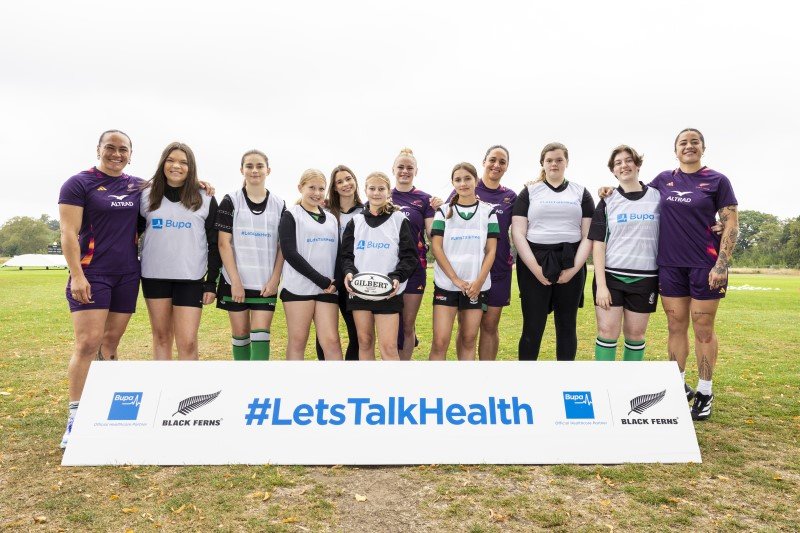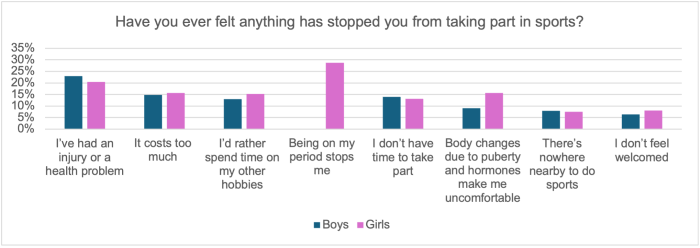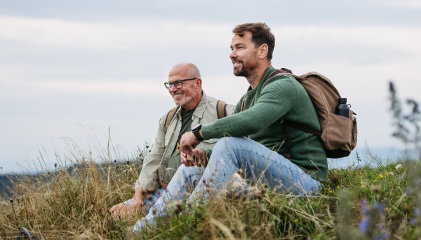New research finds a quarter of girls report a lack of confidence taking part in sport with body image and periods major barriers to participation – but open conversations can help them stay active and thrive.

Click image to open in a new tab
- Bupa and the Black Ferns join forces to talk girls’ health and barriers to sport participation.
- Research shows that girls are six times more likely to drop out of sport than boys*, with new findings from Bupa revealing one quarter of girls (25%) report a lack of confidence when participating.
- Moreover, 1 in 3 girls aged 14–18 (32%) say their period has stopped them wanting to take part – with girls nearly twice as likely as boys to state body changes and hormones makes involvement uncomfortable.
- Let’s Talk Girls’ Health aims to highlight the importance of talking about health and how sport can provide the perfect space to have these open conversations.
Bupa, the official healthcare partner of the All Blacks and the Black Ferns, has launched Let’s Talk Girls’ Health to champion sport’s power to give back physically, socially and emotionally, continuing Bupa’s global movement to encourage more honest health conversations across the world.
Iconic Black Ferns including Portia Woodman-Wickliffe, Katelyn Vahaakolo, Kate Henwood and Jorja Miller, have come together with aspiring young rugby players from York Rugby Union Football Club (York RUFC), talking all things girls’ health – from periods and body confidence to insecurities and growing up, and the strength of sport to bring people together.
Let’s Talk Girls’ Health is driven by new research in France, Spain and the UK which reveals one in four adolescent girls aged 11–18 report they have felt a lack of confidence when taking part in sport, with one in three girls aged 14-18 noting their period as a barrier to participation (32%). Girls are also twice as likely as boys to feel self-conscious about changes to their body and hormones that make taking part in sports uncomfortable (16% vs 9%), rising to nearly one in five girls aged 17-18 (18%).
The findings shine a light on how adolescence continues to be a critical drop-off point in girls’ participation of sport, with emotional and physical changes creating hurdles to keeping active. While boys also experience dips in confidence, girls are further impacted by period stigma and body image concerns – leading many to sit out of activities they might otherwise enjoy.

Click image to open in a new tab
As a result, girls are disproportionately missing out on the benefits that sport offers during this pivotal stage of maturity – with 11-18-year-olds agreeing that when they do participate in sport, it has the greatest positive impact on:
- Better physical health and fitness (74%)
- Greater confidence and self-esteem (42%)
- Improved mental wellbeing (40%)
- Opportunities to build new friendships (36%)
- Increased motivation and drive (35%)
- A stronger sense of resilience (18%)
- A space for self-expression (11%)
- Development of leadership skills (9%)
Research from Bupa earlier this year** revealed that that four in five (82%) agree there are clear mental and physical benefits to sharing personal health experiences.
Emily Davidson, Head of Women and Girls – Community at New Zealand Rugby, commented: “Women and girls’ health and wellbeing is a priority at New Zealand Rugby and that’s why partnering with Bupa, who share this mission, is incredibly exciting for us.”
“Women and girls’ health needs to be talked about more openly in sport, and we are proud to work with Bupa to break down stigmas and create space for real, empowering conversations on topics like periods, and body image. Through sparking these conversations we hope to inspire girls both here in Aotearoa and around the world to feel confident every day to play the sport they love.”
Dr Anne Lepetit, Chief Medical Officer at Bupa, added: “At Bupa, we believe every young person deserves the chance to live the healthiest version of their life, and that includes feeling able to talk openly about their health.
Sport not only builds strong bodies, minds and communities, but also has the unique power to bring people together, creating a space where we can have these open conversations. We’re proud to stand alongside the Black Ferns to help ensure girls everywhere are able to stay active, talk about health, and to thrive, now and in the future.”
* UNESCO, "Women and girls’ access to sport still lagging far behind", 2023
** Mortar Research survey targeting 6,052 respondents in the UK, Australia and Spain (March 2025).
The research has been conducted by Opinium Research on a nationally representative sample of 3,000 young people aged 11-18 in France, Spain, and the UK. The research has been conducted through an online survey between 30th July and 4th August 2025.
Notes to editors
About Bupa
Established in 1947, Bupa's purpose is helping people live longer, healthier, happier lives and making a better world. We are an international healthcare company serving over 60 million customers worldwide. With no shareholders, we reinvest profits into providing more and better healthcare for the benefit of current and future customers. Bupa has businesses around the world, principally in Australia, the UK, Spain, Poland, Chile, Hong Kong SAR, India, Türkiye, Brazil, Mexico and New Zealand. We also have associate businesses in Saudi Arabia.
About New Zealand Rugby
New Zealand Rugby (NZR) strives to inspire and unify through rugby. Since 1892, NZR has led, supported and grown New Zealand’s national game at all levels. From ensuring rugby is at the heart of Kiwi communities to engaging, fan-centric competitions and content, our teams* represent New Zealand with mana, and our goal is to be world-leading on and off the field. We’re guided by our Rugby Way values, which ensure we put the game and the people who love it at the heart of everything we do. *NZR’s teams – All Blacks, Black Ferns, All Blacks Sevens, Black Ferns Sevens, Māori All Blacks, All Blacks XV, and New Zealand Under 20s.



